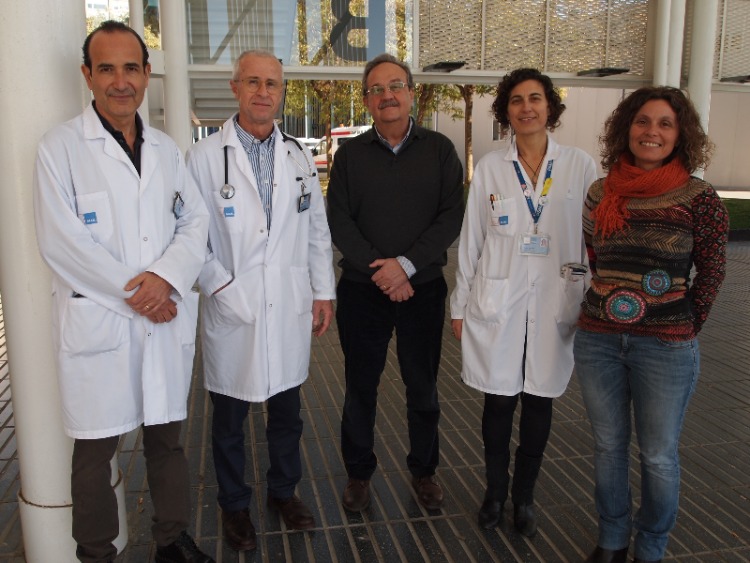
28/06/2019 - Press release
Ageing of NK lymphocytes (Natural killer cells) in HER2-positive breast cancer patients can predict the success or failure of targeted treatments
The ageing of NK lymphocytes circulating in the blood of patients with HER2-positive breast cancer is a marker that can predict the success or failure of monoclonal antibody therapies, which act on a specific factor in tumour cells. This is the conclusion of a study led by researchers from the Hospital del Mar Medical Research Institute (IMIM) and the Pompeu Fabra University, and doctors from the Hospital del Mar, published in the journal Cancer Immunology Research.
The study also involved staff from the Medical Oncology Service at Hospital Clínic in Valencia, the Pathological Anatomy Services at Hospital del Mar, Fundación Jiménez Díaz in Madrid, and the Immunogenetics Service at Puerta de Hierro University Institute, also in Madrid. It involved analysing blood samples from 66 patients, immunogenetic and functional studies of the NK lymphocytes of these patients, as well as analysing tumour biopsies. The ageing of these cells was measured by quantifying the NK lymphocytes in the blood that express the CD57 molecule. The results show that patients with high blood counts at the time of diagnosis are more likely to be resistant to chemotherapy and anti-HER2 antibody treatment. These observations are complemented by in vitro studies showing that NK CD57+ lymphocytes, despite being functional, have less capacity to divide and, possibly, less ability to reach the tumour.

From left to right Joan Albanell, Ignasi Tusquets, Miguel López-Botet, Sònia Servitja, Aura Muntasell.
Ageing of NK lymphocytes and new avenues of research
The ageing of NK lymphocytes, or the number of NK CD57+ lymphocytes, varies in each person according to their age and the influence of genetic and environmental factors, such as the number and type of infections they have dealt with throughout their lives. This study identifies NK lymphocyte ageing as a factor that could condition the effectiveness of anti-HER2 antibody treatment. In fact, in a previous study, the same team of researchers had already demonstrated the relationship between the presence of NK lymphocytes in a tumour, and a positive treatment response. This new work suggests that aged NK cells either do not reach the tumour, or do not survive there, conditioning the efficacy of the treatment.
"Until now, the drugs being developed have focused on boosting the cytotoxic capacity of NK cells. Our results indicate that ageing must also be taken into account when looking for ways to boost their anti-tumour capacity", explains Dr. Aura Muntasell, first author of the work and researcher in the IMIM's Immunity and Infection Research Group. Dr. Miguel López-Botet, last author of the study, head of the Immunology Service at Hospital del Mar, coordinator of IMIM Group, and lecturer at Pompeu Fabra University, comments that "Considering the ageing of NK lymphocytes as being a relevant factor could be extended to other situations, such as, for example, therapies based on the administration of NK cells."
HER2-positive breast cancer and clinical implications
Each year, nearly 28,000 cases of breast cancer are diagnosed in Spain (according to data from the Spanish Society of Medical Oncology; SEOM), of which 4,600 are in Catalonia (according to data from the Department of Health). Of these, between 15% and 20% are the HER2-positive type. This subtype is characterised by the presence of the HER2 oncogene in tumour cells, associated with an aggressive clinical course. Thanks to the development of specific treatments, the poor prognosis has been reversed in all phases of the disease. "However, there are still important challenges related to improving the personalisation of the treatment, learning about de novo and acquired resistance mechanisms, and developing new strategies to continue advancing towards a cure", explains Dr. Sonia Servitja, author of the study and consultant in the Hospital del Mar's Medical Oncology Service.
The number of NK CD57+ lymphocytes can be detected using a small sample of blood when the disease is diagnosed, and the test could be used to identify patients who are unlikely to respond to neoadjuvant treatment. Validating this biomarker will require multicentre studies to standardise the way the number of NK CD57+ is determined and verify its usefulness in a larger patient cohort. "Having this information would allow us to adapt the therapy when the disease is first diagnosed", explains Dr. Joan Albanell, head of the Medical Oncology Service at Hospital del Mar, CIBERONC researcher, director of the IMIM Cancer Research Programme, UPF lecturer, and author of the study. This work was funded by the Spanish Cancer Association.
Reference article
Muntasell A*, Servitja S, Cabo M, Bermejo B, Perez-Buira S, Rojo F, Costa-Garcia M, Arpí O, Moraru M, Serrano L, Tusquets I, Martínez MT, Heredia G, Vera A, Martínez-García M, Soria L, Comerma L, Santana-Hernández S, Eroles P, Rovira A, Vilches C, Lluch A, Albanell J*, López-Botet M. High numbers of circulating CD57+ NK cells associate with resistance to HER2-specific therapeutic antibodies in HER2+ primary breast cancer. Cancer Immunol Res 2019:
© Institut Hospital del Mar
d'Investigacions MèdiquesLegal Notice and Privacy Policy | Cookie Policy | Site Index | Accessibility | Find Us | Contact